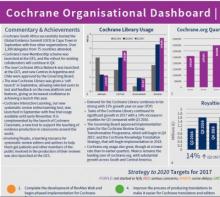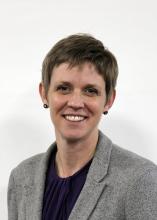It is with deep sadness that we announce to the Cochrane community that Dr. Fredric Wolf PhD died on July 23, 2017 at the age of 71. Fred had been battling two cancers for over a decade. He was a close friend and respected colleague to many of us, and we deeply mourn his loss.
As an academician, Fred had a long and illustrious history in both medical education and biomedical informatics. His highly cited meta-analysis work had an immeasurable impact on physician practices and patient outcomes. Fred was a creative, versatile, non-linear thinker and these traits are reflected in the path of his career.
After 6 years in the Peace Corps in Costa Rica he returned to the US with a goal of getting an MS in education and then return to Costa Rica as a teacher. Instead he discovered a passion for medical education and quantitative research that led to lifelong interests in meta-analysis, evidence-based medicine, clinical reasoning, and decision-making. Later in his career he became an important academic leader and program builder.
In 1980, Fred graduated from Kent State with his PhD and began his academic career at Ohio State University. In 1982, he moved to the University of Michigan where he directed the instructional computing facility at the medical school and later created the Laboratory for Computing, Cognition, and Clinical Skills. His pioneering psychometric work on the validity of patient management problems as a clinical reasoning assessment technique laid the groundwork for the use of “efficiency” measures rather than “proficiency” measures as the basis for scoring performance.
Fred’s 1986 monograph on meta-analysis is widely cited and widely used as an introductory text. He undertook a sabbatical at the UK Cochrane Centre in 1995. Sir Iain Chalmers, the Founding Director of the UKCC, noted that ‘Fred was a greatly appreciated and relatively rare US supporter of The Cochrane Collaboration in its early days'. Following his sabbatical he became an active participant in The Cochrane Collaboration. Several of his meta-analyses and Cochrane systematic reviews are highly cited, including reviews documenting that continuing education programs that include interactive, hands-on training are more likely to change physician practice, and that asthma self-management education and training program have positive effects on children’s and adolescent’s quality of life.
Fred’s 1985 JAMA article on heuristics and biases in clinical reasoning is cited in Jerome Groopman’s best-selling book on How Doctors Think as one of two articles to read “for those interested in the Bayesian approach” to decision making. Teaming up with Chuck Friedman and Arthur Elstein, Fred was a key partner in the “Three Amigos” studies of diagnostic proficiency and computer-based clinical decision support, which resulted in several important publications in the Journal of the American Medical Informatics Association, JAMA, and the Journal of General Internal Medicine.
In 1997, Fred moved from Michigan to the University of Washington, as chair of the Department of Medical Education and Biomedical Informatics. In Seattle, Fred played a critical role in fostering academic Biomedical and Health Informatics at the University of Washington, guiding the department to become a nationally prominent center for research and training. After 13 years as Department Chair, Fred stepped down in 2012 to focus on his own research and teaching which included two very popular courses on evidence based medicine, systematic reviews and meta-analysis. “The foundation [Wolf] laid during his 20 years at UW allowed both biomedical informatics and medical education at UW to grow to their full potential,” said Peter Tarczy-Hornoch, current Chair of the Department of Medical Education and Biomedical Informatics. Fred’s work extended beyond his home department; he was recognized with adjunct professorships in the Departments of Epidemiology, Health Services, and Pharmacy.
Fred brought to his battle with cancer the same energy and tenacity he brought to his academic work. Through an autologous bone marrow transplant and later an unrelated donor transplant, he successfully fought cancer for over a decade—all the while being a wonderful husband to his wife Leora and parent to his three children.
As a scholar, leader, mentor, battler, husband, and parent, Fred was and will ever remain an inspiration for all of us.
Sincerely,
Beth Devine and Jeremy Grimshaw
Members, SRSM
Some of Dr. Fred Wolf’s Notable Publications
Agapova M, Devine EB, Nguyen H, Wolf FM, Inoue LY. Using indirect comparisons to compare interventions within a Cochrane review: a tool for comparative effectiveness research. J Comp Eff Res. 2014 Jul;3(4):345-357.
PMID: http://www.ncbi.nlm.nih.gov/pubmed/25275232
DOI: http://dx.doi.org/10.2217/cer.14.29
Wolf F, Hobby R, Lowry S, Bauman A, Franza BR, Lin B, et al. Education and data-intensive science in the beginning of the 21st century. OMICS 2011 Apr;15(4):217-219.
PMID: http://www.ncbi.nlm.nih.gov/pubmed/21476844
DOI: http://dx.doi.org/10.1089/omi.2011.0009
Emerson GB, Warme WJ, Wolf FM, Heckman JD, Brand RA, Leopold SS. Testing for the presence of positive-outcome bias in peer review: a randomized controlled trial. Arch Intern Med. 2010 Nov 22;170(21):1934-1939.
PMID: http://www.ncbi.nlm.nih.gov/pubmed/21098355
DOI: http://dx.doi.org/10.1001/archinternmed.2010.406
Deshazo JP, Lavallie DL, Wolf FM. Publication trends in the medical informatics literature: 20 years of "Medical Informatics" in MeSH. BMC Med Inform Decis Mak. 2009 Jan 21;9:7-6947-9-7.
PMID: http://www.ncbi.nlm.nih.gov/pubmed/19159472
Free Full Text: https://www.ncbi.nlm.nih.gov/pmc/articles/PMC2652453/pdf/1472-6947-9-7.pdf
DOI: http://dx.doi.org./10.1186/1472-6947-9-7.
Cunningham MR, Warme WJ, Schaad DC, Wolf FM, Leopold SS. Industry-funded positive studies not associated with better design or larger size. Clin Orthop Relat Res. 2007 Apr;457:235-241.
PMID: http://www.ncbi.nlm.nih.gov/pubmed/17195818
DOI: http://dx.doi.org/10.1097/BLO.0b013e3180312057
Lynch JR, Cunningham MRA, Warme WJ, Schaad DC, Wolf FM, Leopold SS. Commercially funded and United States-based research is more likely to be published; good-quality studies with negative outcomes are not. J Bone Joint Surg Am. 2007 May;89(5):1010-1018.
PMID: http://www.ncbi.nlm.nih.gov/pubmed/17473138
DOI: http://dx.doi.org/10.2106/JBJS.F.01152.
Friedman CP, Gatti GG, Franz TM, Murphy GC, Wolf FM, Heckerling PS, et al. Do physicians know when their diagnoses are correct? Implications for decision support and error reduction. J Gen Intern Med. 2005 Apr;20(4):334-339.
PMID: http://www.ncbi.nlm.nih.gov/pubmed/15857490
Free Full Text: https://www.ncbi.nlm.nih.gov/pmc/articles/PMC1490097/
DOI: http://dx.doi.org/10.1111/j.1525-1497.2005.30145.x
Guevara JP, Berlin JA, Wolf FM. Meta-analytic methods for pooling rates when follow-up duration varies: a case study. BMC Med Res Methodol. 2004 Jul 12;4:17.
PMID: http://www.ncbi.nlm.nih.gov/pubmed/15248899
Free Full Text: https://www.ncbi.nlm.nih.gov/pmc/articles/PMC481068/pdf/1471-2288-4-17.pdf
DOI: http://dx.doi.org/10.1186/1471-2288-4-17.
Wolf FM. Methodological quality, evidence, and Research in Medical Education (RIME); Acad Med. 2004;79(10):S68-9.
PMID: http://www.ncbi.nlm.nih.gov/pubmed/15383394
Wolf FM, Shea JA, Albanese MA. Toward setting a research agenda for systematic reviews of evidence of the effects of medical education. Teach Learn Med. 2001 Winter;13(1):54-60.
PMID: http://www.ncbi.nlm.nih.gov/pubmed/11273381
Wolf FM. Lessons to be learned from evidence-based medicine: Practice and promise of evidence-based medicine and evidence-based education; Med Teach. 2000;22(3):251-259.
DOI: http://dx.doi.org/10.1080/01421590050006214
Davis D, O'Brien MA, Freemantle N, Wolf FM, Mazmanian P, Taylor-Vaisey A. Impact of formal continuing medical education: do conferences, workshops, rounds, and other traditional continuing education activities change physician behavior or health care outcomes? JAMA 1999 Sep 1;282(9):867-874.
PMID: http://www.ncbi.nlm.nih.gov/pubmed/10478694
DOI: http://dx.doi.org/10.1001/jama.282.9.867.
Friedman CP, Elstein AS, Wolf FM, Murphy GC, Franz TM, Heckerling PS, et al. Enhancement of clinicians' diagnostic reasoning by computer-based consultation: a multisite study of 2 systems. JAMA 1999 Nov 17;282(19):1851-1856.
PMID: http://www.ncbi.nlm.nih.gov/pubmed/10573277
DOI: http://dx.doi.org/10.1001/jama.282.19.1851
Wolf FM, Miller JG, Gruppen LD, Ensminger WD. Teaching skills for accessing and interpreting information from systematic reviews/meta-analyses, practice guidelines, and the Internet; Proc AMIA Annu Fall Symp. 1997 1997 October 25-29:662-666.
PMID: http://www.ncbi.nlm.nih.gov/pubmed/9357708
Free Full Text: https://www.ncbi.nlm.nih.gov/pmc/articles/PMC2233330/pdf/procamiaafs00001-0696.pdf
Wolf FM. Methodological observations on bias. In: Wachter KW, Straf ML, editors. The future of meta-analysis New York, NY: Russell Sage; 1990. p. 139-151.
Wolf FM. Meta-analysis quantitative methods for research synthesis. Beverly Hills, CA: Sage Publications; 1986.
Wolf FM, Gruppen LD, Billi JE. Differential diagnosis and the competing-hypotheses heuristic. A practical approach to judgment under uncertainty and Bayesian probability. JAMA 1985 May 17;253(19):2858-2862.
PMID: http://www.ncbi.nlm.nih.gov/pubmed/3989960
DOI: http://dx.doi.org/10.1001/jama.1985.03350430070028










